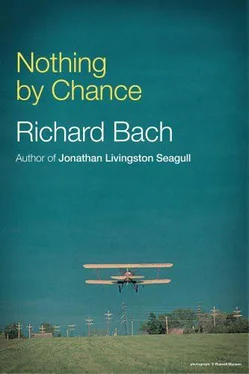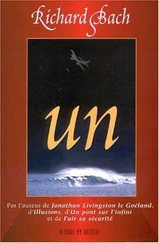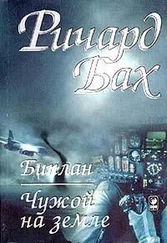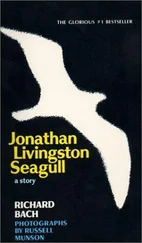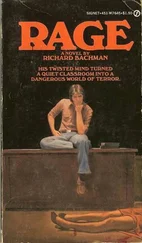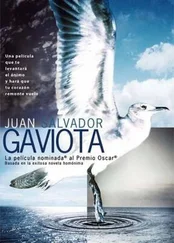But the fragile colored mushroom stayed long in the air, drifting.
We dived down toward it, the biplane and I, wires singing loud, and the closer we came to the parachute, the higher it was from the ground. We eased out of the dive at 1500 feet and circled a little man dangling by strings under a great pulsing dome of nylon.
He had altitude to spare. There never had been any trouble, there had never been any danger at all!
The figure swinging beneath the nylon waved across to me, and I rocked my wings in reply, grateful, puzzled that he should be alive.
And as we circled him, it wasn’t we that turned, but his parachute, spinning around and around the horizon. A strange dizzy feeling.
The angle, of course! That’s how he could be so high in the air now, when I was so sure he had hit the ground… the angle that I watched him from. I had been looking right down on top of him, and his only background was the wide earth all around. His death was an illusion.
He pulled one of the suspension lines and the canopy twisted swiftly around, one turn left, one turn right. He controlled the direction of the parachute at will; he was at home in his element.
It was hard to believe that this courageous parachute artist was the same softspoken boy that had shyly joined The Great American a week ago when it opened in Prairie du Chien. I thought of a maxim learned in twelve years’ flying: Not what a man says, that matters, or how he says it, but what he does and how he does it.
On the ground, children popped like munchkins from the grass, and they converged on Stu’s target.
I circled the chute until it was 200 feet above the ground, then held my altitude while the mushroom went on down. Stu swung his feet up and down a few times, last-minute calisthenics before his landing.
He was one moment drifting peacefully on the gentle air, and the next instant the ground rose up and hit him hard. He fell, rolled, and at once was on his feet again as the wide soft dome lost its perfect shape and flapped down around him, a great wounded monster of the air.
The monster-picture deflated with the parachute and became just a big colored rag on the ground, unmoving, and Stu was Stu in a yellow jump suit, waving OK. The children closed in on him.
When the biplane and I circled to land, I found that we had problems. The Whirlwind wasn’t responding to its throttle. Throttle forward, nothing happened. A little farther forward and it cut back in with a sudden roar of power. Throttle back and it roared on; full back, and it died away unnaturally. Something wrong with the throttle linkage, probably. Not a major problem, but there could be no passenger flying till it was fixed.
We came down rather unevenly to land, coasted over the hill and shut down the engine. Al, of AL’S SINCLAIR SERVICE, walked over.
“Hey, that was nice! There’s quite a few folks here want to fly the two-winger. You can take ’em up this afternoon, can’t you?”
“Don’t think so,” I said. “We like to end the day with the parachute jump… leave ’em with something nice to watch. We’ll sure be here tomorrow, though, and love to have ’em come back.”
What a strange thing to find myself saying. If that was our policy, I had just made it up. I would have been glad to fly passengers till sunset, but I couldn’t do it with the throttle linkage as it was and it would not do to have them see that their airplane had to be repaired after every little flight around the airport.
Stu came in from the target, and the biplane captured quite a number of his young admirers. I stood near the airplane and tried to keep them from stepping through the fabric of the lower wings whenever they climbed up to look in the cockpits.
Most of the grown-ups stayed in their cars, watching, but a few came closer to look at the aircraft, to talk with Paul polishing the Luscombe, and with me, shepherding children.
“I was at the little league game when you guys flew over,” a man said. “My boy was going crazy; he didn’t know whether to look down at the game or up at the planes, so finally he sat on the roof of the car, where he could see both.”
“Your jumper… he’s a pretty young guy, isn’t he? Couldn’t make me jump out of an airplane for all the money in the world.”
“This all you do for a living, fly around places? You got a wife or anything?”
Of course we had wives, of course we had families just as involved in this adventure as we, but that wasn’t something we thought people would want to hear. Barnstormers can only be carefree, footloose, fun-loving bright colorful people from another time. Who ever heard of a married sky gypsy? Who could imagine a barnstormer settled in a house? Our image demanded that we shrug the question aside and become the picture of gay and happy comrades, without a thought for the morrow. If we were to be shackled at all that summer, it would be by the image of freedom, and we tried desperately to live up to it.
So we answered with a question: “Wife? Can you imagine any woman let her husband go flyin’ around the country in planes like these?” And we had lived a little more closely to our image.
Rio was changed by our arrival. Population 776, with a tenth of the town on the airport the evening after we arrived. And the biplane was grounded.
The sun was down, the crowd slowly disappeared into the dark and at last we were left alone with Al.
“You guys are the best thing that happened to this airport,” he said quietly, looking toward his airplane in its hangar. He didn’t have to speak loudly to be heard in the Wisconsin evening. “Lots of people think about us flying our Cessnas, they’re not sure we’re safe. Then they come out here and see you throw those airplanes around like crazymen and jump off the wings and all of a sudden they think we’re really safe.!”
“We’re glad we can help you out,” Paul said dryly.
The tree-frogs set in to chirping.
“If you want, you guys can stay in the office here. Give you a key. Not the best, maybe, but it beats sleepin’ out in the rain, if it rains.”
We agreed, and dragged our mountain of belongings in to carpet the office floor in a jagged layer of parachutes, boots, bedrolls, survival kits, ropes, and toolbags.
“Still don’t see how we get all this stuff into the airplanes,” Paul said, as he set down the last of his camera boxes.
“If you guys want a ride in town,” Al said, “I’m goin’ in; be glad to take you.”
We accepted the offer at once, and when the airplanes were covered and tied, we leaped into the back of the Sinclair pickup truck. On the way, wind beating down over us, we divided up our income for the day. Two passengers at $3 each.
“It’s kind of good,” Stu said, “that all the airplanes from Prairie didn’t stay. By the time you cut six dollars ten ways, there wouldn’t be much left.”
“They could have flown those other passengers, though,” I said.
“I’m not worried,” Paul offered. “I have a feeling that we’re going to do pretty well, just by ourselves. And we made enough money for dinner tonight… that’s all that matters.”
The truck rolled to a stop at the Sinclair station, and Al pointed down the block to the A & W root-beer stand. “They’re the last ones open and I think they close at ten. See you tomorrow out at the airport, OK?”
Al disappeared into his dark service station and we walked to the root-beer stand. I wished for once that I could turn off the barnstormer image, for we were watched as closely as slow-motion tennis balls by the drive-in customers of the Rio A&W.
“You’re the fellows with the airplanes, aren’t you?” The waitress who set our wooden picnic table was awed, and I wanted to tell her to forget it, to settle down and pretend that we were just customers. I ordered a bunch of hot dogs and root beer, following the lead of Paul and Stu.
Читать дальше
